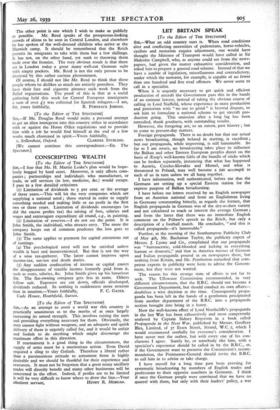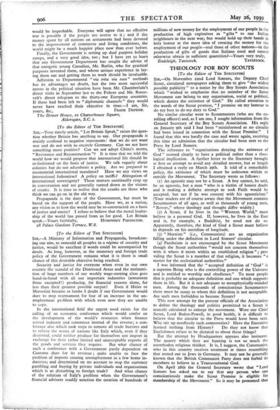LET BRITAIN SPEAK
[To the Editor of THE SPECTATOR] SIR,—What an odd country ours is. When road conditions alter and conflicting necessities of pedestrians, horse-vehicles, cyclists and motorists require adjustment, one would have thought the Minister of Transport would have called in Sir Malcolm Campbell, who, as anyone could see from the news- papers, had given the matter exhaustive consideration, and asked him to prepare a general road scheme. Instead of that we have a jumble of legislation, miscellaneous and contradictory, under which the motorist, for example, is capable of no fewer than one hundred and five road offences. We never seem to call in a specialist.
When it is urgently necessary to get quick and efficient production of aircraft the Government puts this in the hands of an eminent lawyer, instead of taking the obvious course of calling in Lord Nuffield, whose experience in mass production and patriotism with "no axe to grind" is beyond dispute, to ask him to formulate a national scheme to get aircraft pro- duction going. This omission after a long lag has been remedied, thank goodness, with outstanding results.
However, the foregoing are, to an extent, past history ; but to come to present-day matters.
Foreign propaganda. There is no doubt but that our actual news broadcasting, though belated in starting, is excellent ; but our propaganda, while improving, is still lamentable. So far as I am aware, no broadcasting takes place to influence the Balkan and other Eastern European peoples direct on the basis of lEsop's well-known fable of the bundle of sticks which can be broken separately, instancing that what has happened to Austria, Czecho-Slovakia and Memel, and what is threatened to Poland, may well become a fait accompli to each of us in turn unless we all hang together.
I have information, well authenticated, before me that the Germans are setting up a special Eastern station for the express purpose of Balkan broadcasting.
I have before me letters received by an English newspaper from an Austrian national and from an Englishman living in Germany commenting bitterly, as regards the former, that English propaganda in German was of the dry-as-dust variety and not calculated to reach or interest the average German ; and from the latter that there was no immediate English comment on the Fares speech to the Reich, but only a description of a football match. He concludes, "and this is called propaganda—it's lamentable."
Further, at the meeting of the Southampton Publicity Club of May 4th, Mr. Buchanan Taylor, the publicity expert of Messrs. J. Lyons and Co., complained that our propaganda was "bureaucratic, cold-blooded and lacking in everything human or dramatic," and that in America masses of German and Italian propaganda poured in on newspapers there, but nothing from Britain, and Mr. Pemberton remarked that com- petent experts in publicity were keen to advise the Govern- ment, but they were not wanted.
The reason for this strange state of affairs is not far to seek. The Ullswater Commission recommended, in very different circumstances, that the B.B.C. should not become a Government Department, but should conduct its own affairs— doubtless a wise decision at the time. Consequently propa- ganda has been left in the hands of a gentlemen precipitated from another department of the B.B.C. into a propaganda section brought into being in a hurry.
Now the well-known effect of Lord Northcliffe's propaganda in the last War has been exhaustively and most competently analysed by Captain Sidney Rogerson in a book called Propaganda in the Next War, published by Messrs. Geoffrey Bles, Limited, of 37 Essex Street, Strand, W.C. 2, which I would recommend cordially for everyone's consideration. I have never met the author, but with every one of his con- clusions I agree. Surely he, or somebody like him, with a specialist's experience should be called in by the B.B.C., or, if the Government want to preserve the Commission's recom- mendation, the Postmaster-General should invite the B.B.C. to call him in to advise or take charge.
I have myself for a long time past been pressing for systematic broadcasting by members of English trades and professions to their opposite numbers in Germany. I think if once the German people were convinced that we have no quarrel with them, but only with their leaders' policy, a war would be improbable. Everyone will agree that no effective war is possible if the people are averse to it ; and if the money spent by all nations on armaments had been devoted to the improvement of commerce and living conditions, the world might be a much happier place now than ever before. Finally, the Government is setting up dual purpose holiday camps, and a very good idea, too ; but I have yet to learn that any Government Department has sought the advice of that energetic young Canadian, Mr. Butlin, who for practical purposes invented them, and whose unique experience in lay- ing them out and getting them to work should be invaluable.
Adhesion to Departmental "via trita via tura" methods has its advantages no doubt, but the two most successful moves in the political situation have been Mr. Chamberlain's direct visits in September last to the Fithrer and Mr. Roose- velt's direct telegram to the thirty-one European countries. If these had been left to "diplomatic channels" they would never have reached their objective in time.—I am, Sir,



























































 Previous page
Previous page